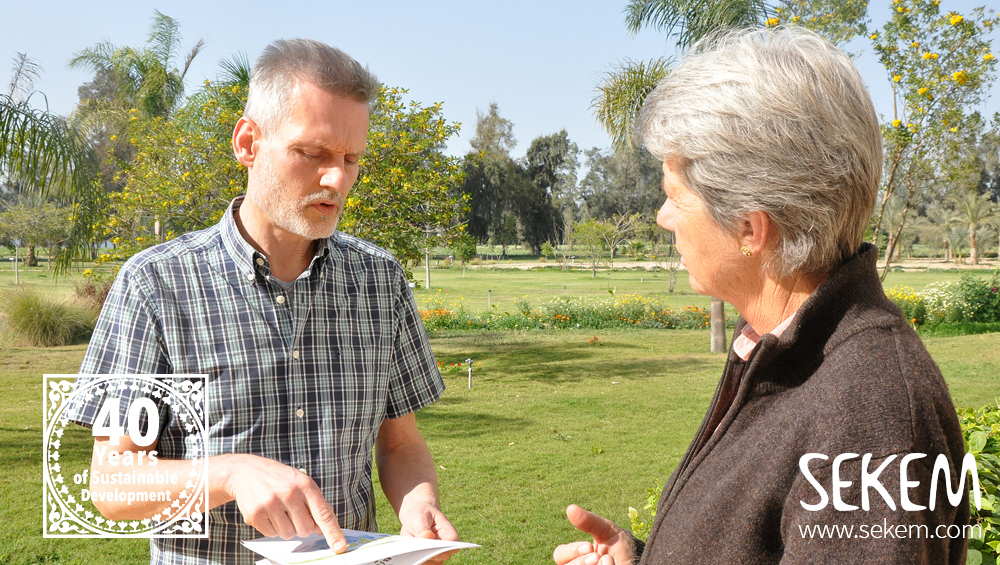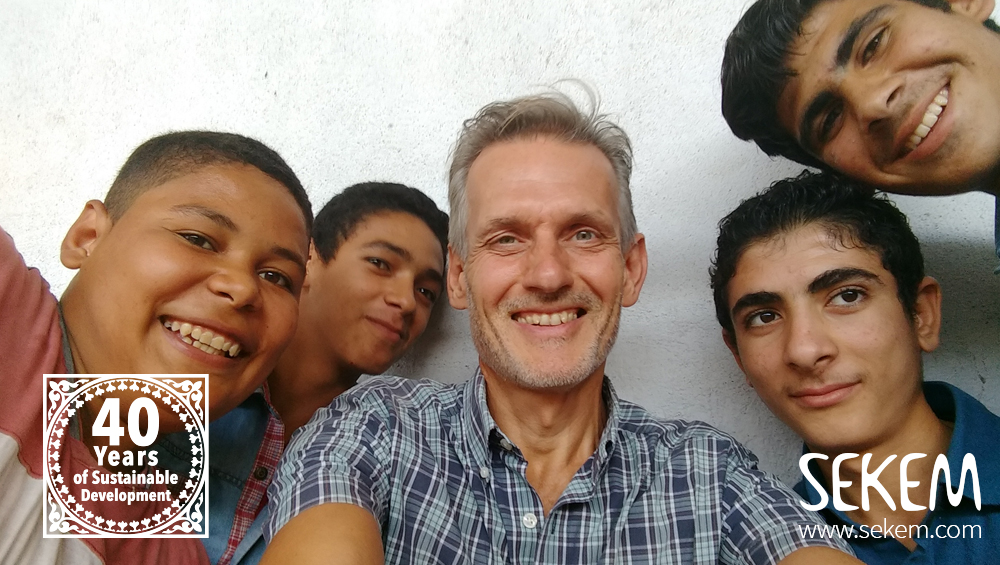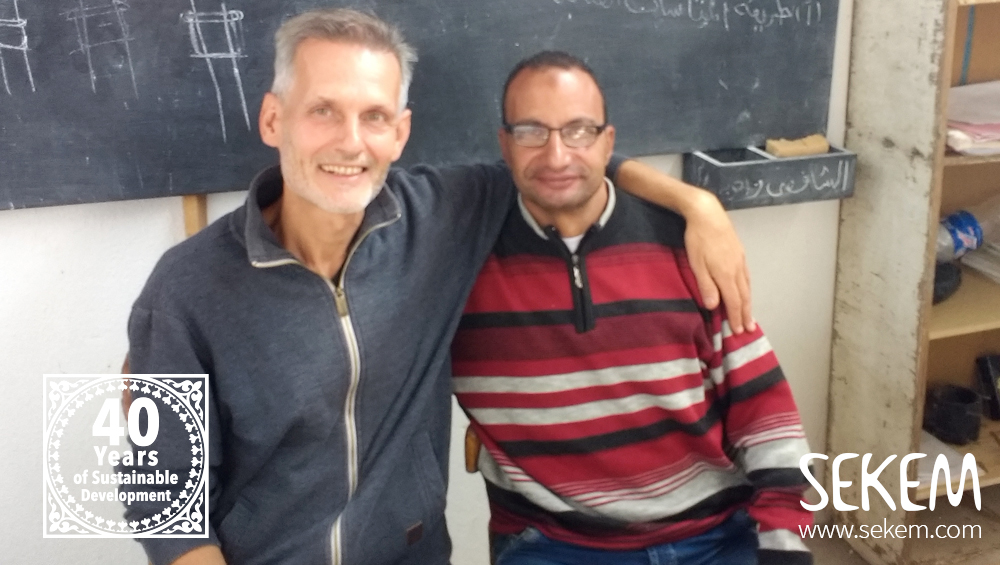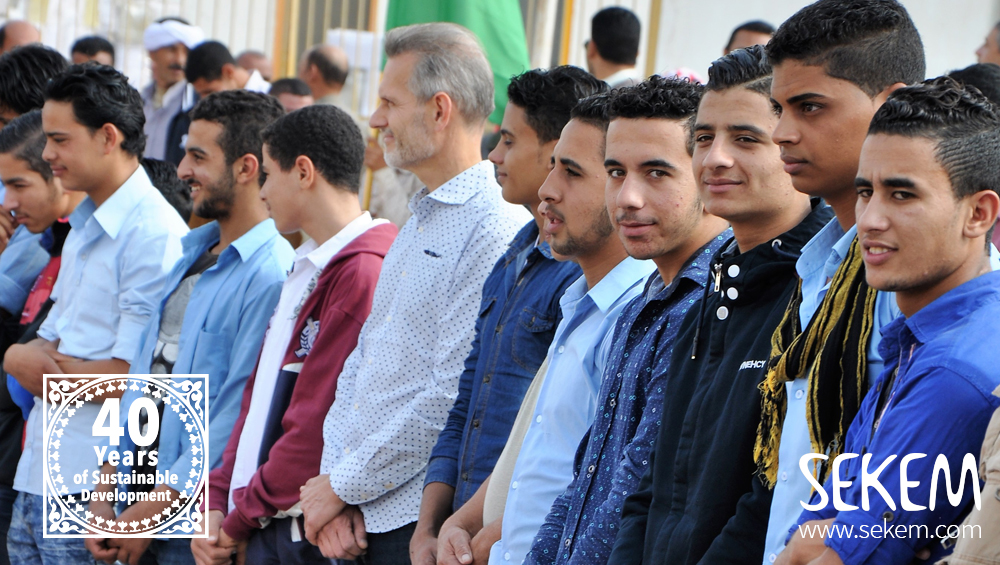In spring 2016 Jan Vermeulen and his partner Ann Lust traveled to SEKEM with the Dutch Association of SEKEM Friends. They were so inspired that they offered to share their experience with SEKEM for one year. Ann mainly worked at SEKEM’s baby group and Jan assisted in the agricultural and plumbing departments at the Vocational Training Centre. As Jan is a health consultant and worked with micro-organisms in Belgium, he also introduced effective micro-organisms (EM) as a starter for the composting of kitchen waste and as a cleaning product at SEKEM. With SEKEM News he shares his experiences in Egypt.
I feel a bit like the comic-strip hero Tintin in Egypt, who decided to take the adventure and step out of the comfort zone of daily life. My partner Ann was asked by the Dutch association of SEKEM friends to support the children’s day-care, so I had to ask myself: “What can I do there?”
When we arrived in SEKEM in October 2016, Angela Hofmann (SEKEMs agricultural coordinator and my buddy) started to find out where I could make myself useful. With, among other things, my technical background and experience with various workshops and tools, the SEKEM Vocational Training Center (VTC) became an area that deserved my extra attention.

During my exploration of the technical workshops and after some talks with the teachers, it quickly became apparent that the application of safety rules and the use of personal and machine protection needs to be put more into focus. Hence, I went to work with teachers and students and I felt that everyday progress took place – sometimes out of conviction, usually because they did me a favor… By regularly having a talk with the teachers about their role model, I hope that they become more and more aware of their position and motivate the pupils to work together in creating a healthier and safer working environment.
Learn to reflect
Angela also told me that students should try to reflect more on their work. “What have I done? How and why did I do it? How did I feel about it? Can it be done differently?” For this purpose, all students have now a notebook in which they are supposed to report on a daily basis. The first step was to literally write down what they have done, which materials they used, their working hours, etc.. More and more, I saw that their notes became more comprehensive and I noticed that some teachers started to give their feedback to the student and not simply signed their reports. This was a huge development, where I could sometimes witness interesting discussions between pupils and teachers. Letting hands, head and heart work together is the goal. I also mentioned this literally to the teachers and students, in my ‘best’ Arabic, but especially with sign language and basic English: “Do, think and feel.”

The plumbing workshop
During my daily walks, I discovered the plumbing workshop. I spent several weeks with its teacher Ibrahim and its students to see how they work and what their needs are. The workshop of approximately 25 m2 was far too small to practice all necessary techniques and skills with 23 pupils in 3 grades. Just like in the other VTC departments, these students follow the training structure of 2 days of theoretical subjects and 4 days of practice. The practice often includes solving plumbing problems in the school and in the factories on the farm, such as cleaning drains and repairing leaking faucets or toilets. There, however, was a need for more variation in practical exercises, based on a proper curriculum.
I started to work out a curriculum on the basis of what the Egyptian government imposes and supplemented it with experiences I had from Europe. I then tested it in the reality in SEKEM and in Egypt and also included agricultural irrigation techniques because this is very relevant in Egypt, and was a certain wish of Dr. Ibrahim Abouleish. Gamal El Sayed, the head of the school, thoroughly studied the new curriculum and approved it.

An empty warehouse belonging to NatureTex was suitable for equipping a fully-fledged plumbing workshop. I have made a basic plan for the design and the purchase of tools and materials (financial support is still needed!). At the beginning of September 2017, we could welcome the students in their ‘new’ plumbing workshop and gradually introduced the workplace exercises in the following months. The aim of the training is that the students can work as independent plumbers and become qualified to build and restore irrigation systems in agriculture.
But here, too, success will depend on the teacher’s awareness and the support of the school management to focus constantly on the bigger picture in order to keep up the motivation and patiently transfer the knowledge and skills, again and again. I feel: Many seeds have been planted in a fertile soil.
Jan Vermeulen
SEKEM Friends Association Netherlands
Helpful Donation: New Machines for SEKEMs Vocational Training Center
New Generation of Biodynamic Farmers at SEKEMs Vocational Training Center

